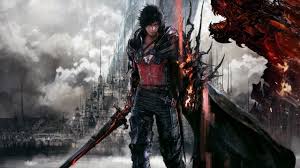As you step into the intricate world of JRPGs, it’s like peeling back the layers of an ancient manuscript, revealing hidden complexities waiting to be deciphered.
But beyond the acronym lies a realm of gaming that has shaped the industry in profound ways. From the humble beginnings to the present-day innovations, JRPGs have woven a tapestry of storytelling and gameplay that continues to captivate audiences worldwide.
What lies ahead for this genre, and how will it continue to influence the gaming landscape? Let’s explore together.
Origins of JRPGs
The origins of JRPGs can be traced back to the early days of video gaming when developers in Japan began experimenting with new gameplay mechanics and storytelling techniques. These games, like 1986’s ‘Dragon Quest’ and 1987’s ‘Final Fantasy,’ laid the foundation for what would become a beloved genre known for its immersive worlds and engaging narratives.
In these early JRPGs, players were drawn in by turn-based combat, character progression through experience points, and intricate storylines filled with memorable characters and epic quests. The influence of traditional tabletop role-playing games, such as Dungeons & Dragons, can also be seen in the emphasis on exploration, character customization, and strategic decision-making.
As technology advanced, JRPGs evolved to incorporate more complex gameplay systems, improved graphics, and cinematic storytelling elements. The genre continued to innovate, blending traditional RPG elements with unique features like real-time combat, branching narratives, and moral decision-making that shaped the player’s journey. These innovations have helped JRPGs maintain their popularity and relevance in the gaming industry to this day.
Evolution of Gameplay Mechanics
Exploring the realm of JRPGs further unveils the fascinating evolution of gameplay mechanics over the genre’s storied history. From the early days of turn-based combat and menu-driven interactions, JRPGs have continuously adapted and innovated their gameplay mechanics to keep players engaged. One significant evolution is the shift towards real-time combat systems, where players must think quickly and make split-second decisions during battles. This change has added a new layer of excitement and dynamism to traditional JRPG gameplay.
Another notable development in gameplay mechanics is the emphasis on exploration and open-world environments. Modern JRPGs often feature expansive worlds for players to discover, filled with side quests, hidden treasures, and dynamic encounters. This shift towards open-world design has allowed for greater player agency and immersion in the game world.
Additionally, many JRPGs now incorporate intricate skill trees, crafting systems, and customizable character progression paths, giving players more control over their gameplay experience. These mechanics add depth and complexity to the gameplay, allowing for a more personalized and engaging journey through the fantastical worlds of JRPGs.
Character Development and Storytelling
Delving into the realm of JRPGs reveals how character development and storytelling intertwine to create immersive and captivating gaming experiences. In JRPGs, you often find yourself embarking on epic quests alongside a diverse cast of characters, each with their own unique personalities, motivations, and backstories. Through engaging dialogue, cutscenes, and interactions, these characters evolve and grow throughout the game, forming deep connections with both the player and each other.
One of the key aspects of character development in JRPGs is the player’s ability to shape the story through their choices and actions. Whether it’s deciding how to respond to a moral dilemma or choosing which characters to form alliances with, these decisions have a direct impact on the narrative and ultimately shape the outcome of the game.
Furthermore, JRPGs are renowned for their intricate and often emotionally charged storylines. From ancient prophecies to political intrigue, these games weave complex narratives that keep players invested and eager to uncover what lies ahead. By immersing yourself in these richly crafted worlds, you become not just a player, but an integral part of a larger, interconnected story waiting to unfold.
Influence on Global Gaming Culture
As JRPGs continue to captivate players worldwide, their influence on shaping global gaming culture becomes increasingly evident. These games have left a lasting impact by introducing unique gameplay mechanics, intricate storytelling, and memorable characters that have resonated with gamers across the globe.
One significant way JRPGs have influenced global gaming culture is through their emphasis on storytelling. With intricate plots, well-developed characters, and emotional depth, JRPGs have set a high standard for narrative-driven games. This focus on storytelling has influenced developers worldwide to prioritize rich, immersive narratives in their own games.
Additionally, JRPGs have also shaped global gaming culture by introducing innovative gameplay mechanics. From turn-based combat to complex character progression systems, JRPGs have pushed the boundaries of game design and inspired developers to experiment with new ideas and mechanics.
Future Trends and Innovations
Looking ahead, future trends and innovations in JRPGs promise to revolutionize the gaming landscape with cutting-edge technology and immersive experiences. One exciting trend on the horizon is the integration of virtual reality (VR) and augmented reality (AR) technologies into JRPG gameplay. Imagine stepping into the shoes of your favorite character, exploring fantastical worlds in a whole new dimension.
Furthermore, artificial intelligence (AI) is set to play a significant role in shaping the future of JRPGs. AI-driven NPCs with dynamic decision-making abilities could create more realistic and engaging interactions, making the game world feel truly alive.
Another innovation to watch out for is the rise of cloud gaming services, allowing players to access JRPGs seamlessly across different devices. This could potentially eliminate hardware limitations and provide a more flexible gaming experience for enthusiasts.
Conclusion
You now have a better understanding of JRPGs and their impact on the gaming world.
From their origins in Japan to their evolution in gameplay mechanics and storytelling, JRPGs have left a lasting mark on global gaming culture.
As the genre continues to evolve, future trends and innovations will only further solidify their place in the gaming industry.
So next time you pick up a JRPG, remember the rich history and legacy behind those three simple letters.
